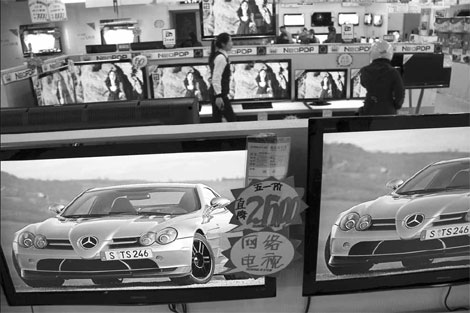TV adds the Internet, piracy disputes follow
Updated: 2012-07-11 07:58
By Wang Xin (China Daily)
|
||||||||
|
Internet TVs on sale at a supermarket in Nantong, Jiangsu province. Haidian district court in Beijing recently ruled that electronics giant Sony was not guilty of copyright infringement even though its TVs were sold with a pre-loaded link to a Web portal carrying unauthorized content. Xu Ruiping / China daily |
As Internet TV begins to replace conventional broadcasts, hotly debated issues surrounding online piracy are beginning to migrate from the Web to the tube.
But the fledgling Internet TV manufacturing industry has a bit more structure after Haidian district court in Beijing recently ruled that electronics giant Sony was not liable when its TV set was used to access infringing online programs.
Industry observers said the ruling set a precedent in a field that lacks standards, cross-company compatibility and clear legal guidelines.
Shuimu Animation filed the complaint against Sony (China) and online content provider Beijing AnviewTech, claiming they pirated its copyrighted 52-episode series China's Five-Thousand-Year History and asked for more than 1.55 million yuan ($243,242) in compensation.
The Shanghai-based animation maker told the court that one of its employees bought an Internet-compatible Sony-made LCD TV in April last year and soon found a pre-loaded list for early childhood programs that linked to Shuimu's animation series offered by the AnviewTech portal.
It alleged both defendants should be held liable for transmitting the unauthorized program.
Yet Sony told the court that it "is just the producer of TV sets" and not a content provider.

The court ruled that as the hardware maker, Sony cannot control what is accessed after the TV is connected to the Internet.
As well, the manufacturer is not in a position to edit or sort content on linked websites, the court ruled.
A signed memo between Sony and AnviewTech makes no mention of revenues, only "technical cooperation", the court found.
Co-defendant AnviewTech claimed Shuimu Animation authorized the copyright for the program to another firm, Panhai Hongxing, for use online, which in turn licensed it to AnviewTech.
It also disagreed with the claim for compensation, saying "the series is not a hit any longer so its market value is not so high".
The court found the evidence failed to prove that AnviewTech had legal authorization to carry the program. It ordered the portal to stop infringement and pay Shuimu Animation 20,000 yuan in compensation as well as 5,000 yuan in legal fees.
"TV set makers are relieved," Beijing attorney Chen Nan told Legal Evening News. "The verdict won't cause a contraction in the entire industry."
Following the ruling, more cases targeting online video providers are expected because copyright owners stand a high chance prevailing in court, he said.
Chen added that the ruling will have an impact on the nascent Internet TV content industry still in its startup stage.
Li Zizhu, a judge in Chaoyang district court with long experience in IP cases, said copyright disputes over film and TV programs are often the result of repeated authorization through layers of companies.
Copyright owners grant the authorization to online companies that in turn authorize another firm, a practice that is not legally binding, Li said.
Along the chain, the final party will be liable for infringement damages, according to the current copyright regulation, the judge added.
Beijing attorney Liu Lin said the field is clouded with uncertainty due to close associations between local Internet TV manufacturers and video portals as well as repeated authorizations.
Using the Internet on a TV is now entirely feasible with existing technology, Ding Zhong, head of an interactive media industry federation, told local media.
At a cost of less than 200 yuan, manufacturers can sell a TV set for an additional 2,000 yuan if it is Internet compatible, Ding said.
Yet due to a lack of uniform industry standards, various producers use a range of chips and operating systems. An open application platform has yet to be adopted that would make different brands compatible, industry insiders said.
wangxin@chinadaily.com.cn
(China Daily 07/11/2012 page17)

 Relief reaches isolated village
Relief reaches isolated village
 Rainfall poses new threats to quake-hit region
Rainfall poses new threats to quake-hit region
 Funerals begin for Boston bombing victims
Funerals begin for Boston bombing victims
 Quake takeaway from China's Air Force
Quake takeaway from China's Air Force
 Obama celebrates young inventors at science fair
Obama celebrates young inventors at science fair
 Earth Day marked around the world
Earth Day marked around the world
 Volunteer team helping students find sense of normalcy
Volunteer team helping students find sense of normalcy
 Ethnic groups quick to join rescue efforts
Ethnic groups quick to join rescue efforts
Most Viewed
Editor's Picks

|

|

|

|

|

|
Today's Top News
Health new priority for quake zone
Xi meets US top military officer
Japan's boats driven out of Diaoyu
China mulls online shopping legislation
Bird flu death toll rises to 22
Putin appoints new ambassador to China
Japanese ships blocked from Diaoyu Islands
Inspired by Guan, more Chinese pick up golf
US Weekly

|

|







